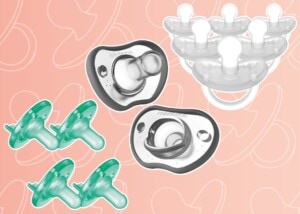Many mothers are led to believe that once the baby is here and greets us earthside, it must mean the journey is over for us, right? Wrong. So, so wrong. After you have the baby, the “fourth trimester” starts.5 And it can be a doozy. The fourth trimester is the most challenging part of growing and having a baby. It’s a total shift in how you’ve lived your life for the past nine months. Right after birth, your estrogen and progesterone levels drop dramatically.1 With your hormones all over the place, along with the physical and emotional act of giving birth, it can knock you down on your knees, leading to postpartum rage.
What Is Postpartum Rage?
Postpartum rage is when you experience irritability, anger, frustration, or fits of rage after giving birth as you adjust to having a new baby in your life.2 Mothers may describe “postpartum rage” as seemingly coming from nowhere, and it leaves them feeling depleted and shameful or guilty afterward. It can occur when your expectations of motherhood (that you will be joyful and positive about your mothering journey) don’t align with the reality and challenges of parenting.2,3
It’s important to know you’re not alone in feeling those feelings of “postpartum rage” during this rough period. People often talk about postpartum anxiety or depression, but while there is some crossover with things like irritability or changes in mood (which form part of those diagnoses), it’s not necessarily about feelings of depression or anxiety. Instead, you experience outbursts, anger, and frustration. It follows with guilt and shame for experiencing postpartum rage.2
What Are the Symptoms of Postpartum Rage?
The symptoms of postpartum rage may include:2,6
- Uncontrollable temper or intense anger and frustration
- Screaming or swearing at others more than normal
- A physical expression of anger, such as punching or throwing objects
- Feelings associated with depression, such as sadness and loneliness
- Dwelling on things that make you upset for longer than normal
- Being unable to improve your mood on your own
- Experiencing violent thoughts or urges
- Feeling a flood of emotions, such as shame, after an episode
Although you may be experiencing these symptoms, not much on the outside may indicate there’s a problem. Sure, there are the bags under your eyes from lack of sleep. You may be short and sometimes rude with your words. But that isn’t uncommon for a new mom.7 After all, you may still be recovering from birth and are caring for a newborn. While you may have tried to prepare yourself for this postpartum experience, you cannot truly be ready for the reality of it.
It’s important to note that symptoms or signs of postnatal rage could also signal things like postpartum depression, postpartum anxiety, or another postpartum mood disorder.2,6 So, seek support if you notice any other changes in your mood, well-being, or ability to cope. You should also get help if these symptoms are impacting your bond with your baby or causing suicidal feelings or thoughts of harming your baby.3
Postpartum Rage Is Not Uncommon
Many women don’t realize that postpartum rage is common.2,6 However, mothers may be scared to talk about it, experience it, and explore what is bubbling under the surface. As mentioned, our hormones have been on the largest rollercoaster known to man for the past nine months. The world expects us to return to normal, drop everything, and become the ultimate #1 mom. Sometimes, it feels like the world forgets we moms are human beings who may have difficulty adjusting to our new life. What about seeing us as people who have gone through something intense? Yes, it’s incredible and something we are grateful for, but it’s a massive mental, physical, and emotional change in our lives. Perhaps we, too, need to be comforted and treated as we recover.
Birth can be a beautiful thing, and it is a beautiful thing. There is nothing like finally meeting a healthy baby after a long time of unknowns and worry. However, I recognized that a lot of my postpartum rage came from not being recognized as a woman who just went through hell to meet her baby. Don’t get me wrong; “Mom” is a great title. But we are still individuals with needs to meet. That shouldn’t be too much to ask.
You Are Not Alone
There are also many postpartum scenarios women deal with. Postpartum is not a one-size-fits-all, and it doesn’t affect everyone the same. Some mothers have experienced miscarriage, stillbirth, or infertility. Does that make their postpartum journey any less than? Not even close. Postpartum rage can be much harder to deal with in those situations. Without a saving grace, it’s even harder to go on and hold in some of that rage while continuing your everyday life. Your hormones are still there, your feelings are valid, and the postpartum emotions can become unbearable in these situations. It’s important to know that you’re not alone.
The “fourth trimester” is an important time for you, and the people around you must know that you need care, compassion, and support. It’s a time to love and nurture your baby — but also be loved and nurtured yourself. You are not any less of a mom if you’re experiencing sadness and rage or not feeling yourself. Of course, you should be thankful for what you have, but you can also acknowledge what you’ve been through. You are starting your new role as a mother; just don’t forget about the role you played before this new life.
What To Do and Treatments for Postpartum Rage
If you find yourself feeling intense rage postpartum, prioritize getting help. There are several treatment options, so it’s best to talk to your doctor to determine the best route for you. Here are some of the different options:2
- Support groups: Receiving self-help advice and meeting other mothers going through the same experiences may help validate your feelings. You can join a support group that meets online or in person.
- Talk therapy: You may consider going to talk therapy with a trained counselor or psychologist to discuss your experiences and learn coping techniques for anger and other emotions.
- Medication and/or hospitalization: When necessary, medication or hospitalization may be needed temporarily to help improve a mother’s overall state of mind.
Resources for Postpartum Rage
If you or someone you know is experiencing bouts of postpartum rage and needs more help and information, consider reaching out to one of these resources:
- Postpartum Support International (PSI): PSI offers online support groups, teletherapy, a helpline, online professional training, and other services.
- Phone or text crisis line: 1-800-944-4773
- The Bloom Foundation: This organization offers free peer-to-peer support group calls on Zoom calls led by trained postpartum advocate facilitators.
- National Alliance on Mental Illness (NAMI): This mental health organization is dedicated to building better lives for the millions of Americans affected by mental illness.
- Phone helpline: 800-950-6264
- Text “Helpline” to 62640
- 988 Suicide & Crisis Lifeline: This organization offers free 24/7 helplines for people in a crisis who may be considering taking their lives.
- Call or text: 988
Above all else, you’re not alone in these uncharted waters. You are a part of a community of moms who have the same feelings postpartum as you do. There are many of us out there, and we all need to stick together in the roughest times, knowing we’ll get through this. They say it takes a village to raise a child. It also takes a village to love and care for the mother of that child.













